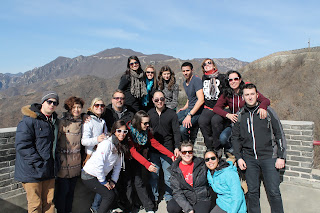Tuesday 13 March 2012
The Anthropological vs. Tourist - written by Christie and Heather
What separates ITEM
China from other modules in PDP is the focus on cultural awareness and
integration. Before embarking on our adventure, we spent considerable time in
our classroom discussing potential challenges of international travel regarding
cultural differences. Thus far, our position in this adventure has been more
“tourist” in nature than anthropological.
We have had the luxury of translators, guided tours, large population of
English speaking people, familiar food, and classmates we have known for 7
weeks. Although we have prepared for the cultural shock often felt by
international travelers, our classmates have felt varying degrees of the
phenomenon. As we travel to Xi’an to teach in schools we will gain a more
intimate relationship with Chinese students and their lives.
Participating in the
anthropological experience is a conscious effort that takes a great amount of
energy. We have noticed that though opportunities to ‘find the anthropologist
within,’ are all around us, during most interactions we are faced with choice.
We can choose to be present in our experiences and be analytical about the
unfolding of an interaction or we can choose (likely subconsciously but also
more frequently) to be absent from the learning opportunity and do what makes
us comfortable, which usually entails removing ourselves from that which causes
our discomfort (ie: conversations that we don’t understand, food that we don’t
recognize, etc.). We have found that when the effort is made, and we expend the
additional energy to actually make note of the ‘why’s’ and ‘what’s’ of our
experience there is plenty to be learned about ourselves as travelers and also
as teachers.
During a free evening
in Beijing, we found ourselves in a small restaurant nearby our hotel. The
owners spoke limited English, just as we speak limited Mandarin; our challenge
in ordering food was requesting the meal to be prepared vegetarian. Our practiced lines: “is there meat in this?”
and “we do not eat meat” seemed to be well received; however, when the meals
arrived they were not vegetarian. In
trying to make our conversation understandable for both parties we employed
sounds, gestures and English and Mandarin. Each party helped their members to
try and understand what the other party was trying to express. By choosing to be the anthropologist we were
able to extract the value from this experience rather than allow an
uncomfortable situation to defeat us. We actively noted the forms of attempted
communication and discussed the potential worth of our experience as teachers.
As
esl teachers, this will help us to better appreciate how ‘the other’ feels and
which skills we must employ to reach an understanding between ourselves and
those we are communicating with. As ITEM students our experiences in the
community and adventures in a foreign country will help cultivate our empathy
and responsiveness to second language learners.
Our own role as learners is a round the clock responsibility, we must be
constantly present in our interactions and thoughtful about how they can help
us to better understand our students. Going into the schools, we look forward
to having a more personal experience and gaining a deeper understanding of our
new friends in the East.
Subscribe to:
Posts (Atom)
























































